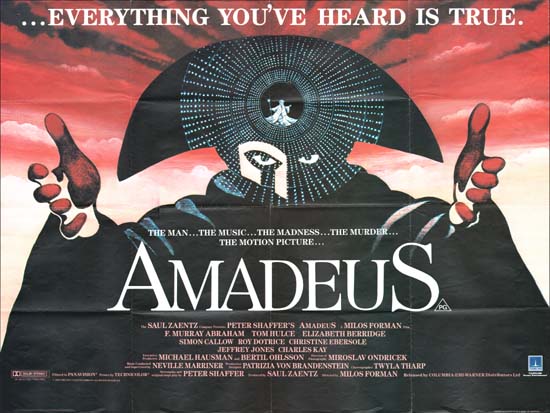Thought it was time I started on doing full-length reviews of my favourite movies of all time, and where better to start than Milos Foreman‘s movie adaptation of Peter Schaffer‘s tour de force stage play, Amadeus? This is how I reviewed it in a potted summary in my list of Top 20 All-Time Movies:
F Murray Abraham’s tour de force Oscar-winning performance is totally riveting, but far from the only reason to watch this powerful tale of Mozart’s death, told from Salieri’s unreliable memory in the context of his personal battle against his deity. American accents notwithstanding, this is a movie I can watch repeatedly for the drama, the storytelling, the acting, the glorious music and the operatic scenes. This is truly a movie in a million.
Let’s start with some myth-busting: of course this movie is not historically accurate – Mozart was not killed by Salieri in any way, shape or form. But that is not what Amadeus is saying, the story being told through the unreliable memory of the ageing Salieri from his own deranged perspective, he being undeniably as mad as the proverbial hatter. A priest comes to the lunatic asylum where the long forgotten Salieri is resident to hear his confession, thus begins the devious and cunning yarn.
Salieri weaves a tale of his devotion to God and his art at the Hapsburg court in Vienna. The same God, in Salieri’s warped view, sends the coarse, vulgar Mozart to thumb his nose at the court composer. The deity to whom he had devoted his life has given him enough talent to realise how mediocre his own work is compared to that of Mozart, to whom the notes fly down from heaven and are transcribed without blemish, truly the music of God.
So Salieri rebels. The God he has worshipped with devotion becomes his enemy. He by symbolically burning his crucifix, but the focus of his new strategy is to find ways to destroy Mozart in any way he can. Being the clever, resourceful and influential man he is, hindering Mozart’s career while appearing to be his friend is not at all difficult, but then comes the idea that should be Salieri’s crowning glory. In the guise of his late father Leopold, Salieri gives the financially challenged Mozart a commission to write a requiem mass for the dead, knowing that this work will kill him. Then he, Salieri, will be able to claim the requiem mass as his own composition, played at Mozart’s funeral as a tribute to his much-loved friend.
Except God has the final tragic word… he not only kills his creature (in Salieri’s eyes), leaving his creation to suffer the indignity of a pauper’s grave while Salieri slides into anonymity for a further 30 years of life, torturing his own soul with taunts of being the patron saint of mediocrity. Maybe this is Salieri’s form of karma, for having wished death on Mozart, but in telling the story he reminded me of Coleridge‘s Ancient Mariner for bemoaning his own bad luck and having brought it upon himself.
What makes Amadeus work so brilliantly is that it combines to far exceed the sum of its parts, each of which are sumptuous and worthy of massive praise in their own right. The dramatic storytelling is nothing short of compelling – no matter how many times I watch, my eyes are riveted to every nuance and detail, lovingly crafted on screen by Foreman. Creating 18th Century Vienna in Prague was in itself a master stroke – the city lends itself perfectly to Mozart’s Vienna, the backdrop to the sinister intrigue of Salieri’s tale.
Then there is the cast. F Murray Abraham’s performance is not only Oscar-winning but one of the few genuinely to deserve the gongs and the plaudits. He is mesmerising in every scene, and the role is huge, covering the whole of the character’s adult life up to the descent into senility. Abraham passes on all counts, a performance that can be viewed repeatedly without losing any of the vivid freshness. This is acting of the highest quality, in what is not only a huge role but one requiring immense subtlety, craft and guile to depict the various facets of the complex character that is Salieri.
The supporting cast play superbly but are in his shadow throughout. Tom Hulce was also nominated for an Oscar as the giggling puppet, though his American accent gets in the way of a fine performance. I’m also very partial to Simon Callow‘s shaded portrayal of Schickaneder and Jeffrey Jones dry comic turn as the Emperor Joseph II, but this is strong ensemble playing throughout.
However, if it stopped there this would be a fine movie but not a great one. The two factors that make this movie stand the test of time are the glorious visual cinematography of Miroslav Ondricek and the sublime music of Neville Marriner. The music is not hidden away here but is an integral part of the structure and syntax of the movie. The operatic and orchestral scenes are simply magnificent, used either to enhance or counterpoint the dramatic tension, though Salieri’s eloquent and emotional rendering of the dazzling and heartrendingly beautiful Mozart repertoire, especially the requiem mass that, according to his rival, kills Mozart.
This is the highlight of Salieri’s life, copying down the music to the dying Mozart’s Requiem Mass from the composer’s own lips. The description of each component building layers into the full richness of the formidable Dies Irae Confutatis. The scene is simply perfect in every way – worthy of being considered a classic in its own right. The language of music is a character in its own right, as never before – the right tune selected for the right moment, played with clarity and empathy, deconstructed with clarity to demonstrate the art of great composition. This is one of the finest scenes you will find in any cinematic context, yet few recognise it as such.
Accents notwithstanding, this is a movie I can watch repeatedly for the drama, the storytelling, the acting, the music and the operatic scenes. This is truly a movie in a million.







